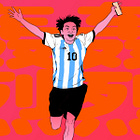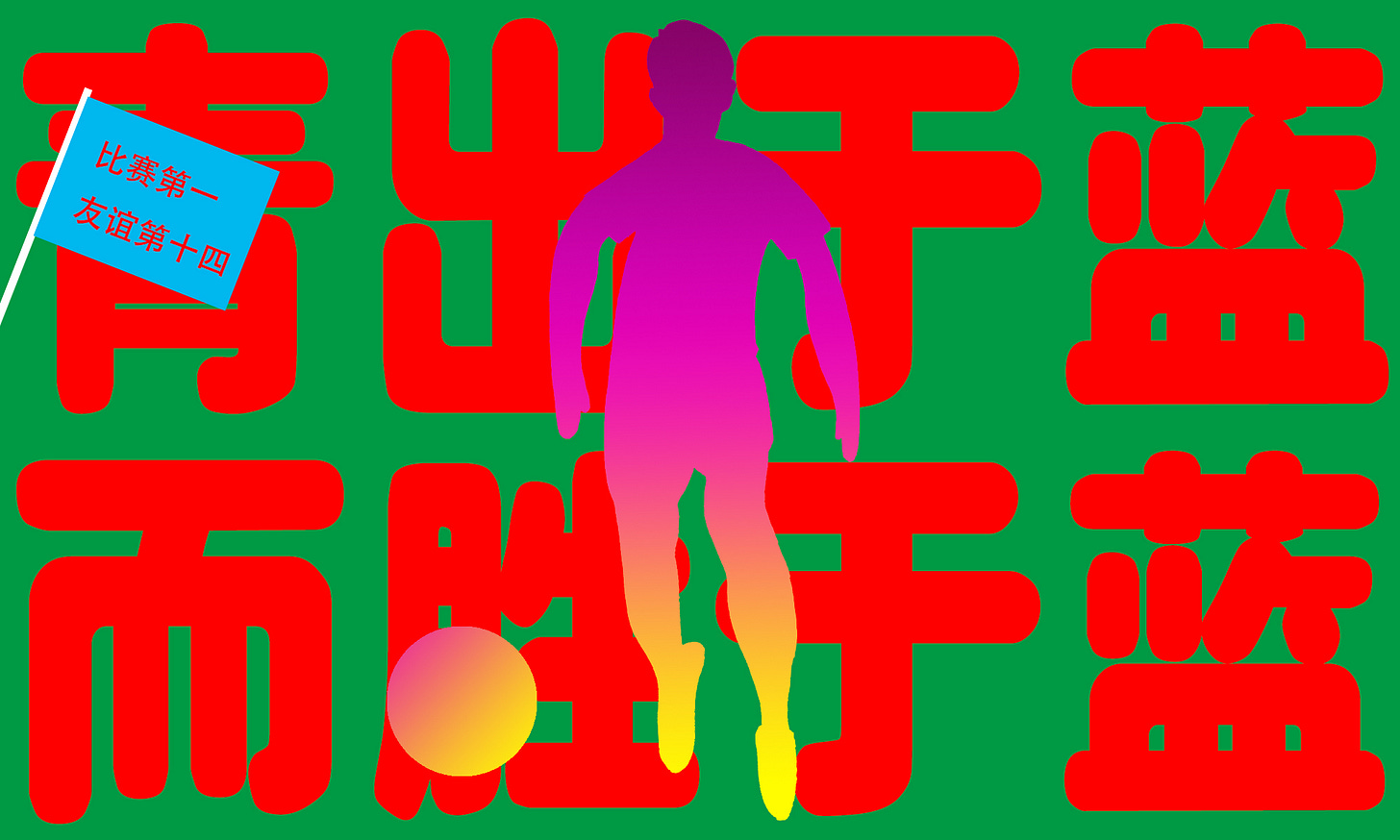Welcome to RealTime Mandarin, a free weekly newsletter that helps you improve your Mandarin in 10 minutes a week.
Subscribe today to get your fluency back, stay informed about China, and communicate with confidence in Chinese — all through immersion in real news.
This week we're off to Jiangsu (江苏). It’s a province I've never been to, but our editor, Zoe Qian (钱周易), is from.
Jiangsu is China's wealthiest province per capita, with average income in 2024 of over $22,000. Sitting on the eastern coast just above Shanghai, it has a population of 84 million.
There are 13 major cities in Jiangsu, known by locals as the "thirteen guardians" (江苏十三太保), a reference to how each city has its own distinct character. This has also led to the term "scattered Jiangsu" (散装江苏), which pokes fun at how people identify more with their city than the province.
As most of China is struggling with falling consumer spending, these 13 cities are enjoying a consumption boom thanks to a grassroots football tournament launched in May: the Jiangsu Football City League, known as Jiangsu Super or "Suchao" (苏超).
Jiangsu Super features 13 amateur teams representing each "guardian" city: Nanjing (南京), Suzhou (苏州), Wuxi (无锡), Changzhou (常州), Zhenjiang (镇江), Yangzhou (扬州), Taizhou (泰州), Nantong (南通), Yancheng (盐城), Huai'an (淮安), Lianyungang (连云港), Xuzhou (徐州), and Suqian (宿迁).
The seven-month league has two stages: in the first round each team plays all others home and away, then the top eight teams play in the knock-out round. Players are mostly amateurs—local students, factory workers, and office staff—with each side allowed up to three ex-professionals.
Games regularly draw crowds of over 30,000, with a record 60,396 fans attending the Nanjing–Suzhou derby in July, the largest attendance ever for amateur football in China.
For policymakers and businesses, Suchao is more than just football—it's a branding and consumption boost energising 13 city economies, similar to how "Village Super" (村超) drove consumer spend in Guizhou in 2023.
The popularity of Jiangsu Super has led to big increases in footfall at local attractions, and also in sales of city tourism packages. Data shows Jiangsu received over 12 million tourists during Dragon Boat Festival three-day holiday in May, generating 4.7 billion yuan ($650 million USD) in tourism spend, with the buzz around the recently-launched Jiangsu Super being a draw for many people.
Related
Memes are flowing
Why has Jiangsu Super become so popular so quickly?
A big factor is social media.
“Suchao” hashtags have attracted billions of views with entertaining word-play and memes driving the viral popularity.
It began with Nanjing's creative marketing slogan for their July match against Suzhou:
"Competition first, friendship fourteenth" (比赛第一,友谊第十四)
In other words: there is no friendship among these thirteen cities on the football field; it’s all about who’s going to win!
This led to a wave of memes from fans of other teams drawing on historical and cultural city-specific references that everyone in Jiangsu and China knows.
For outsiders (especially language learning like us!), understanding the "great war of memes" (玩梗大战) requires serious knowledge of Chinese history and Jiangsu culture.
The most popular ones include:
Nanjing vs. Suzhou is compared to the ancient Chu–Han rivalry (楚汉相争), turning the derby into a battle echoing Chinese history.
Xuzhou vs. Suqian is dubbed the "Chu–Han contest" (楚汉争霸), linking their clashes to the hometowns of Liu Bang (刘邦) and Xiang Yu (翔宇).
Yangzhou vs. Zhenjiang is known as the "dim-sum derby" (早茶对决), celebrating each city's breakfast culture traditions.
Nanjing vs. Wuxi is the "Salted duck vs. Honey peach" showdown (盐水鸭 vs. 水蜜桃), with playful chants: "Have the salted duck with sugar" (咸鸭加糖) if Wuxi wins, and "Have the honey peach with salt" (桃子加盐) if Nanjing wins.
Suzhou vs. Wuxi is the "Southern Jiangsu derby" (苏南德比), with the slogan: "Suzhou owns Taihu Lake; Wuxi owns the airport" (苏州守住了太湖,无锡守住了机场).
Nantong vs. Nanjing is the "Southern Brother contest" (南哥之争) — both of the cities have 南 in the name and can both be called “southern brother” (南哥).
Taizhou vs. Nantong is framed as "Winner gets dim sum; loser gets test papers" (赢了喝早茶,输了写试卷) — Taizhou is famous for its dim sum, while Nantong for its hardcore education system.
But my favourite, and the one which was most confusing, involves the team from Changzhou (常州), which until this week hadn't won a match.
Fans parody defeats by erasing strokes from the city's name: from 常州 (11 strokes) to 吊州 (6 strokes), then 巾州 (3 strokes), and finally just "丨州" (1 stroke).
Now affectionately known as the "thirteenth little sister" (十三妹) languishing at the bottom of the league, Changzhou has turned this losing streak on the field, into marketing magic off the field, as one observer notes:
"Only 20% of the traffic generated by the Jiangsu Super belongs to Nantong, who ranks first in match points, while the remaining 80% all goes to Changzhou".
苏超热度"只有两成属于比赛积分第一名南通,其余八成都归常州了"。[3]
Local Changzhou sponsors found themselves getting national exposure thanks to the city's viral embrace of consecutive drubbings.
On June 21, during the Changzhou vs. Nanjing match, a bright yellow advertising board from a barbecue restaurant appeared prominently: "Dongha · Street BBQ from Northeast China" (东哈·东北街边烧烤). It contrasted strikingly with surrounding corporate ads from Li Auto, Bank of Jiangsu, and others.
This small restaurant run by a middle-aged Harbin couple became a “must-visit hotspot” (打卡热点) in Changzhou, with hundreds queuing for barbecue every day.
As seen in cities of Harbin (哈尔滨) and Zibo (淄博) in recent years, Changzhou and the other 12 cities of Jiangsu are riding the tournament's “unexpected windfall of traffic” (泼天的富贵), with small businesses like Dongha BBQ enjoying huge increases in customers.
Fans are cheering
But this is not just about social media hype.
Jiangsu Super has captured attention of football fans by offering what Chinese professional football has lost, or maybe never really had: grassroots engagement.
Professional leagues are tainted by excess commercialism, and endemic corruption. And fans are cynical about teams named after provinces, which feel distant. Whereas Jiangsu Super teams represent individual cities which residents can identify with.
Some observers note Jiangsu Super has created fan culture similar to England's lower-league teams with devoted local followings, giving people "their own team" in a way commercialised professional leagues in China don't.
So finally Chinese football fans have something to cheer about:
We once despaired that China was not fertile ground for football, and that perhaps we didn't even need to bother with football at all.
But Jiangsu Super has at least proven that football can still bring us joy, and that's enough.
曾经我们绝望地认为中国不是热爱足球的土壤,搞不好甚至就不需要搞足球了,但“苏超”至少证明了,足球依旧还可以为我们带来快乐,这就足够了。[2]
So, why is Jiangsu Super so popular, and will it last?
That’s what we’re discussing this week!
Favourite Five
1. 草根 cǎo gēn
grassroots
苏超最打动人心的,还在那份草根的生命力 - What's most moving about Jiangsu Super is its grassroots creativity. [1]
2. 感召力 gǎn zhào lì
appeal, inspirational power
“苏超”以更加“纯粹”的地域感召力,获得了更多观众的青睐 - With its authentic local appeal, Jiangsu Super has won the favour of more fans. [2]
Note: correct pronunciation is zhào, but often pronounced as zhāo
3. 地域之争 dì yù zhī zhēng
regional or local rivalry
认为南京的观众们只是热爱参与省内的地域之争 - They believe that Nanjing’s audience simply loves taking part in city rivalries within the province. [2]
4. 釜底抽薪 fǔ dǐ chōu xīn
take away the firewood from under the pot, tackle the root cause
“苏超”凭借这一点,似乎从根本上对职业足球“釜底抽薪” - With this approach, Jiangsu Super seems to have tackled the root cause of professional football’s woes. [2]
5. 青出于蓝而胜于蓝 qīng chū yú lán ér shèng yú lán
the student surpasses the master
其他十二个城市纷纷跟进,甚至青出于蓝而胜于蓝,演变为一场城市名片的“梗文化大战” - The other twelve cities quickly joined in, and in the sense of “students surpassing their teacher”, created slogans even funnier than Nanjing, which turned the whole thing into a “meme battle” of city image and pride. [1]
Note: Our phrase of the week in tomorrow’s Sinica!
This week on the RTM Advanced podcast, our editor, Zoe (who is from Wuxi), explains the background to one of the memes about her hometown:
"Suzhou owns Taihu Lake; Wuxi owns the airport" (苏州守住了太湖,无锡守住了机场).
It’s an infrastructure gag. I think you have to be there to get it!
She also explains two common phrases when talking about consumer trends in Chinese:
“Cultural IP” (文化 IP) and “closed loop consumption” (消费闭环).
Tune in at 11 minutes where we break down what they mean, how native speakers use them, and how you can use them in real conversations.
Even better: every RTM post is also packed with content, tools and resources to inspire you to get back into learning Chinese every week, and wave good bye to that nagging rusty feeling.
Let's dive in! 🏊♂️
Consuming the Conversation
Useful words
6. 撬动 qiào dòng
leverage, drive
要充分发挥城市足球联赛撬动作用,促进文旅体商深度融合 - It is important to tap into the leveraging effect of city football leagues to foster deep integration of culture, tourism, sports, and business. [1]

















